Woman Pressured By Ex to Get Rid of Daughter's Pets Because of His Son's Allergies Even Though He Has No Contact With Them
Having a pet can be incredibly fun for kids. They make great companions, teach us how to care for them, and even help us learn responsibility.
But what if someone in the family is allergic to the pet? That means they might get sick or sneezy around their furry friend.
It's tough because we want everyone to be happy and healthy, but we also want to keep our pets. Finding a solution that keeps everyone safe and happy can be challenging.
OP, a single parent with a 14-year-old daughter from a previous relationship, recently purchased a rabbit and two guinea pigs for her child. Although the pets reside at OP's home, her daughter's half-brother (the son of her ex-partner) experiences allergic reactions when around them.
Given that they share a bedroom, the boy is frequently exposed to OP's daughter and the pets. The exact allergen causing the reactions remains unknown, prompting OP's ex-partner to insist on rehoming all the pets.
However, OP's daughter adamantly refuses to part with her beloved animals, a sentiment that OP shares. When OP suggested alternative solutions, such as the boy using medication or her daughter residing with her full-time, her ex-partner reacted angrily and resorted to name-calling.
OP bought her daughter guinea pigs and a rabbit, causing her half-brother, who is allergic, to have reactions as they share a bedroom.

OP's ex wants her to rehome the pets because of allergies, but the daughter opposes it, so OP suggested medication or having the daughter live with her full-time as an alternative.

The Dynamics of Co-Parenting and Conflict
This situation highlights the complexities of co-parenting, particularly when it involves differing perspectives on children's well-being. A study in Parenting: Science and Practice shows that co-parents often face significant challenges when balancing their children's needs with their own preferences.
Conflict can arise when one parent prioritizes their child's health concerns over the other parent's emotional attachments to pets, leading to tension and misunderstandings.
Cross-contamination needs to be prevented, not rehoming pets.
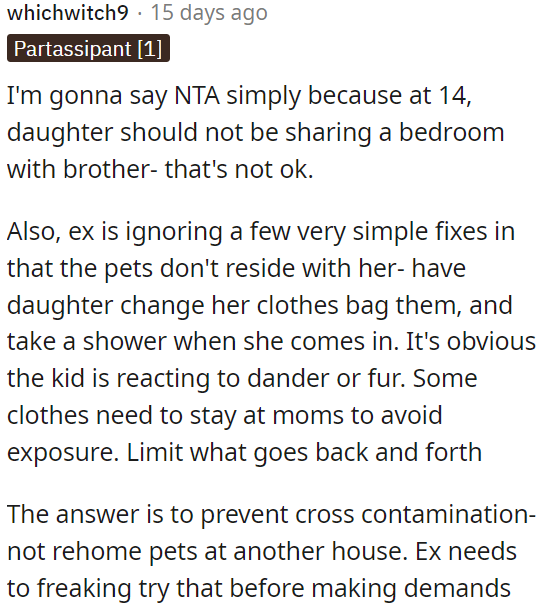
Shared rooms for kids are a concern regardless of minor details like pet hair.
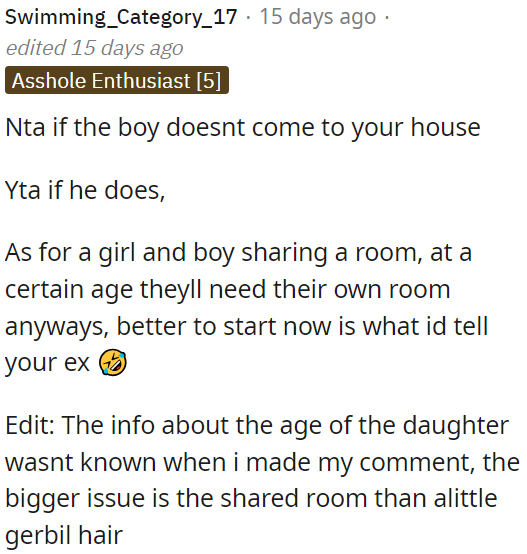
Moreover, this scenario reflects attachment theory, which posits that early emotional bonds influence later relationships and conflicts. According to Dr. Michael Thompson, a child psychologist, "Parents often project their own attachment styles onto their children, which can significantly impact family dynamics, including decisions about pets." Understanding these dynamics can help parents navigate conflicts by recognizing the emotional roots of their concerns, as noted by Dr. Dan Siegel, who states, "Awareness of our emotional patterns allows us to make more informed choices in our relationships."
Both adults are at fault for being unable to manage the straightforward task of ensuring the child takes a shower.

The ex's actions may be deemed neglectful or dramatic, or both.
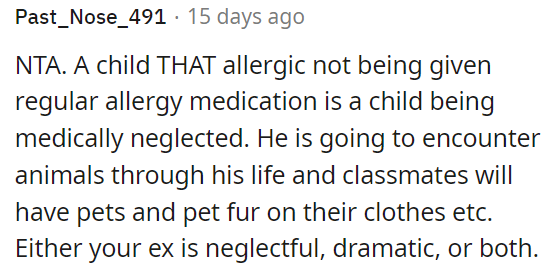
Effective Communication Strategies for Co-Parents
To manage conflicts arising from differing perspectives on children's needs, effective communication is essential. Co-parents should practice active listening to ensure both parties feel heard and understood.
Utilizing 'I' statements can also help express feelings without placing blame, fostering a more constructive dialogue about children's needs and preferences.
OP must assert her authority over decisions in her own home, regardless of her ex's input.

OP needs to ensure her daughter's clothes are washed the night before, she showers (including hair washing) just before going, and keeps her bag away from the animals to minimize the allergens he's exposed to.
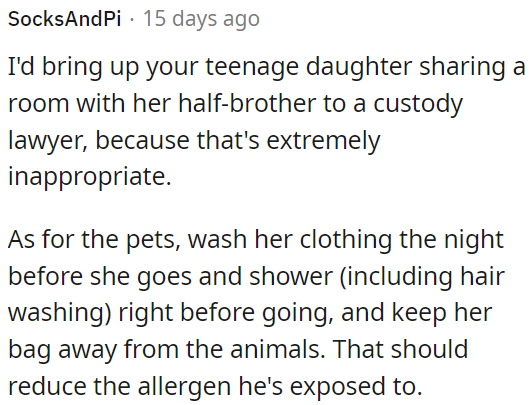
It's more important to stop things like pet hair from spreading around than to get rid of the pets altogether. When kids share a room, it's always a concern, especially if one of them has allergies.
Both parents should ensure the child takes a shower regularly to help with the allergies. The way the ex is acting seems a bit excessive and not very helpful.
To help with the allergies, OP's daughter should shower and change into clean clothes before going near her brother if possible. The ex's demand to get rid of the pets doesn't make much sense, especially when there are other ways to address the allergies, like having the daughter shower before visiting her dad.
OP needs to take charge of decisions in her own home, no matter what her ex thinks.
OP's ex's stance appears unreasonable.
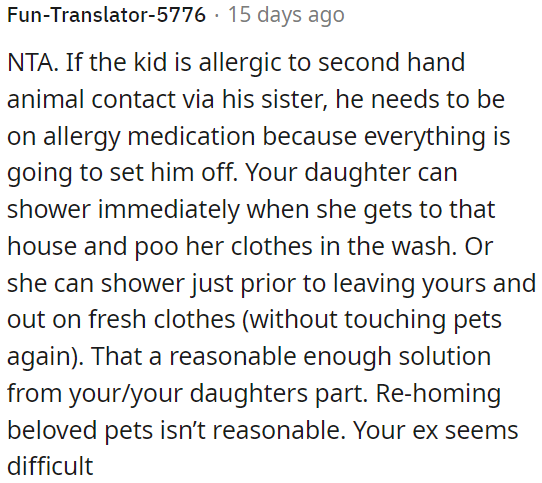
OP's daughter can shower and change into clean clothes at her father's house.
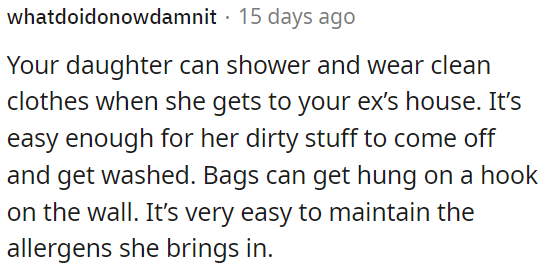
Additionally, establishing clear agreements on how to handle such situations can help mitigate conflicts. Research shows that co-parents who create structured plans for addressing children's health concerns are more likely to reach amicable agreements.
Having a written agreement can serve as a reference point, reducing misunderstandings and promoting cooperation.
If the boy is allergic, efforts should be made to manage his allergies.
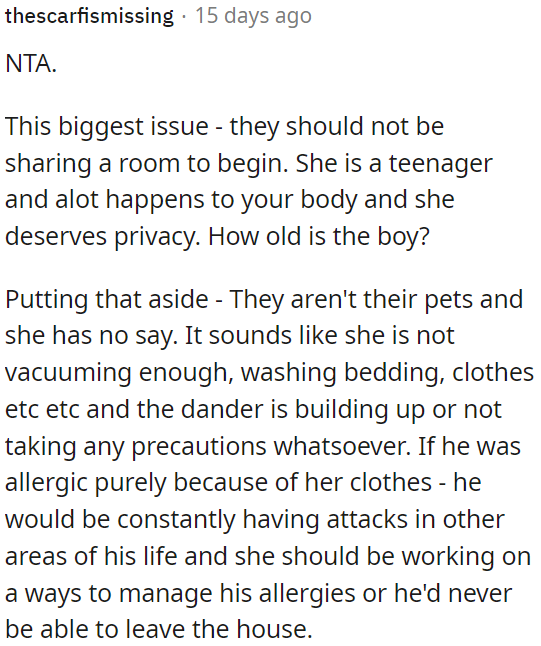
Psychological Analysis
This scenario reflects common challenges in co-parenting, particularly when differing views on children's needs emerge. It's essential for both parents to communicate openly and find solutions that honor both perspectives. Fostering empathy and understanding can significantly improve co-parenting dynamics.
Analysis generated by AI
Analysis & Alternative Approaches
In conclusion, this situation underscores the complexities of co-parenting and the importance of effective communication and empathy. By addressing conflicts thoughtfully and collaboratively, co-parents can work towards solutions that prioritize their children's well-being while respecting each other's perspectives.
The Importance of Empathy in Co-Parenting
Ultimately, cultivating empathy is crucial for successful co-parenting. Understanding each other's emotional attachments to pets can help co-parents navigate disagreements more effectively. As Dr. Esther Perel, a renowned couples therapist, states, "Empathy is the antidote to conflict; it allows us to see the world through the eyes of others." Fostering empathy leads to better co-parenting outcomes and enhances children's emotional well-being. By approaching conflicts with compassion and understanding, co-parents can create a more harmonious environment for their children.



